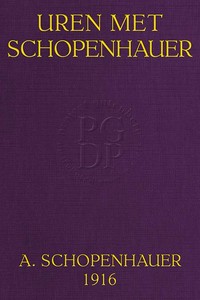Uren met Schopenhauer by Arthur Schopenhauer
"Uren met Schopenhauer" by Arthur Schopenhauer is a philosophical compilation written in the early 20th century. The text serves as a selection of excerpts from Schopenhauer's works, annotated and introduced by Prof. Dr. Jhr. B. H. C. K. van der Wijck. The book explores the ideas of will, knowledge, and the duality of appearances and reality as expressed by Schopenhauer, highlighting the contrast between intellectualism and voluntarism. At the start of the
text, the author references a discussion surrounding the nature of philosophical inquiry, indicating the importance of separating the philosopher from their work. The opening portion delves into the dichotomy between intellectualist thinkers like Thomas Aquinas and voluntarists like Duns Scotus, setting the stage for Schopenhauer's ideas. It discusses how these contrasting views have influenced modern philosophy, particularly Schopenhauer's pivotal beliefs regarding the fundamental nature of will as the driving force behind human existence, contrasting this notion against rationalist frameworks typical of thinkers such as Hegel. (This is an automatically generated summary.)
Read or download for free
| How to read | Url | Size | |||
|---|---|---|---|---|---|
| Read now! | https://www.gutenberg.org/ebooks/72184.html.images | 388 kB | |||
| EPUB3 (E-readers incl. Send-to-Kindle) | https://www.gutenberg.org/ebooks/72184.epub3.images | 249 kB | |||
| EPUB (older E-readers) | https://www.gutenberg.org/ebooks/72184.epub.images | 258 kB | |||
| EPUB (no images, older E-readers) | https://www.gutenberg.org/ebooks/72184.epub.noimages | 200 kB | |||
| Kindle | https://www.gutenberg.org/ebooks/72184.kf8.images | 503 kB | |||
| older Kindles | https://www.gutenberg.org/ebooks/72184.kindle.images | 481 kB | |||
| Plain Text UTF-8 | https://www.gutenberg.org/ebooks/72184.txt.utf-8 | 325 kB | |||
| Download HTML (zip) | https://www.gutenberg.org/cache/epub/72184/pg72184-h.zip | 230 kB | |||
| There may be more files related to this item. | |||||
Similar Books
About this eBook
| Author | Schopenhauer, Arthur, 1788-1860 |
|---|---|
| Translator | Wijck, B. H. C. K. van der (Bernard Hendrik Cornelis Karel), 1836-1925 |
| Title | Uren met Schopenhauer |
| Original Publication | Baarn: Hollandia-Drukkerij, 1916. |
| Series Title | Boeken van wijsheid en schoonheid |
| Note | Reading ease score: 60.2 (8th & 9th grade). Neither easy nor difficult to read. |
| Credits | Wouter Franssen, Jeroen Hellingman, and the Online Distributed Proofreading Team at https://www.pgdp.net/ for Project Gutenberg (Koninklijke Bibliotheek, The Hague) |
| Language | Dutch |
| LoC Class | B: Philosophy, Psychology, Religion |
| Subject | Philosophy |
| Subject | Schopenhauer, Arthur, 1788-1860 |
| Category | Text |
| EBook-No. | 72184 |
| Release Date | Nov 20, 2023 |
| Copyright Status | Public domain in the USA. |
| Downloads | 173 downloads in the last 30 days. |
| Project Gutenberg eBooks are always free! | |

